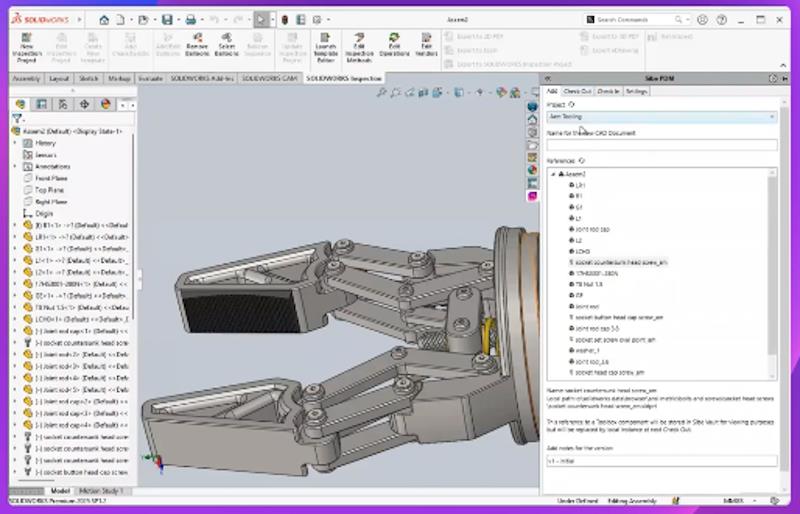
Key Features Of Cloud-Based PDM Systems For Better Product Management
November 12, 2025 by David Edwards
In product management, even seconds count and every move matters. That's why companies need top-notch solutions at the right time.
A cloud-based Product Data Management (PDM) system offers all the necessary features to efficiently manage time-consuming processes. It fosters collaboration, increases data security, and facilitates access to data.
Let's understand some key features that an organization needs to determine how this system can transform its operations.
Enhanced AccessibilityCloud PDM offers the capability of accessibility. Users can access and modify data from anywhere using any device. This flexibility enables real-time collaboration among team members, regardless of their location. It allows for round-the-clock access, reducing downtime and making sure that every team member is aligned.
Efficient CollaborationCollaborating with multiple stakeholders is central to product management. This allows users to work on various projects simultaneously, a feature that cloud-based PDMs enable.
You can easily see what your team members have been working on, and new information is available to everyone at the right time. It also facilitates innovation by allowing teams to share ideas and feedback promptly.
Data Security and BackupData security is a matter of concern for nearly all companies. Cloud-based PDM solutions are cloud-based SaaS products that provide high security for sensitive information.
Data is protected against unauthorized access and other vulnerabilities through encryption, regular updates, and adherence to industry standards. Automatic backups prevent file loss, which is a boon to managers and the team.
ScalabilityOver time, especially as a business scales, its data management needs can also change. Cloud-based PDM solutions help companies scale resources as needed.
It is this flexibility that helps keep the system efficient and cost-effective for organizations of all sizes and needs. With scalable solutions, sustainable growth becomes possible without significant infrastructural changes.
Cost-EffectivenessA cloud-based PDM can reduce the costs associated with traditional data management systems. These systems do not require expensive hardware and do not lead to high maintenance costs.
Many providers offer pay-as-you-go pricing models, enabling organizations to manage their expenses effectively. It promotes superior budgetary control by reducing both the initial costs and long-term operational costs.
Integration CapabilitiesSeamless integration with existing systems facilitates a smooth transition to the cloud PDM. An API-compatible software works seamlessly with any existing systems an organization uses, giving them the freedom to use the most comfortable tool of their choice.
It minimizes disruption and creates better overall efficiency within the product management process.
Version ControlHandling multiple versions of a product can be tricky. Cloud-based PDM features include version control, which tracks changes and maintains a record of all modifications.
This ensures every team member works on the actual/latest version of a product. It also reduces mistakes and confusion, as the old versions are available in case they are needed.
Improved ProductivityCloud-based PDM systems boost productivity by automating repetitive tasks. Automated alerts, timely reminders, and planned workflows minimize the need for manual intervention.
This saves time, allowing team members to focus on other vital activities and improving efficiency across product management tasks.
A User-Friendly InterfaceA smooth user interface is always a plus. Simplicity is one of the core principles of the cloud-based PDM; team members do not need extensive training to understand how it works.
It reduces the learning curve, enables rapid adoption, and enhances user experience with intuitive tools. Together, these attributes improve overall collaboration.
Real-Time AnalyticsCloud-based PDM systems offer additional inherent advantages, including real-time analytics. These tools provide insights into the functioning of your product, team productivity, and market trends.
They enable organizations to make data-driven decisions and accelerate their product management efforts whenever necessary. As such, real-time analytics support planning and allow teams to identify areas for improvement.
ConclusionCloud PDM provides a comprehensive suite of capabilities for just-in-time product management. These benefits include improved accessibility, support for seamless collaboration, and robust data security, allowing organizations to thrive.
This technology can enhance productivity and reduce costs, ensuring that organizations remain relevant in an increasingly complex business environment. This tool can help companies grow and adopt innovative systems and processes to ensure operational stability and efficiency.
Legal Disclaimer:
MENAFN provides the
information “as is” without warranty of any kind. We do not accept
any responsibility or liability for the accuracy, content, images,
videos, licenses, completeness, legality, or reliability of the information
contained in this article. If you have any complaints or copyright
issues related to this article, kindly contact the provider above.


















Comments
No comment